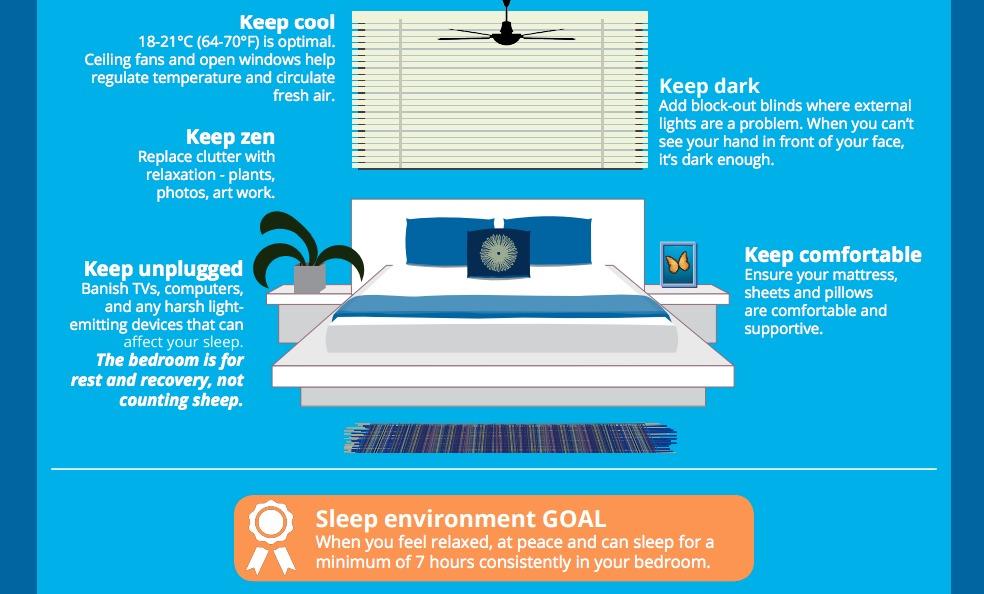In our fast-paced world, where the demands of daily life often overshadow our basic needs, achieving quality sleep has become an elusive goal for many. The importance of restful sleep cannot be overstated; it acts as the cornerstone of physical health, emotional stability, and cognitive function. Yet, countless individuals find themselves tossing and turning each night, grappling with stress, screens, and other distractions that disrupt their natural sleep cycles. In this article, we will explore essential tips for achieving better sleep every night—practical strategies rooted in science and experience that can help you reclaim your nights and elevate your overall well-being. Whether you’re a chronic insomniac or simply seeking to enhance your nightly routine, these insights will guide you toward restorative sleep and the numerous benefits it brings.
Table of Contents
- Understanding Sleep Cycles and Their Impact on Restorative Sleep
- Creating an Optimal Sleep Environment for Enhanced Comfort
- Establishing a Consistent Bedtime Routine to Promote Better Sleep Hygiene
- Nutrition and Lifestyle Choices That Support Quality Sleep
- To Wrap It Up
Understanding Sleep Cycles and Their Impact on Restorative Sleep

To understand how to improve your nightly rest, it’s crucial to explore the different stages of sleep. Sleep is comprised of several cycles, each lasting approximately 90 minutes and typically consists of two main phases: Non-REM (Rapid Eye Movement) sleep and REM sleep. During Non-REM sleep, the body moves through three stages, from light sleep to deep sleep. In contrast, REM sleep is when dreaming occurs, representing a stage vital for emotional regulation, memory consolidation, and overall cognitive function. Both phases are essential for restorative sleep, as they allow the body to recover physically and mentally.
To optimize your sleeping patterns, consider the following strategies that align with your natural sleep cycles:
- Establish a Consistent Sleep Schedule: Going to bed and waking up at the same time every day helps regulate your body’s internal clock.
- Create a Relaxing Bedtime Routine: Engage in calming activities before bed, such as reading or meditating, to signal your body it’s time to unwind.
- Avoid Stimulants: Limiting caffeine and nicotine intake, particularly in the afternoon and evening, can enhance sleep quality.
- Optimize Your Sleep Environment: Ensure your bedroom is dark, quiet, and cool, supporting deeper sleep stages.
- Track Sleep Cycles: Utilizing sleep tracking apps or wearables can help assess your patterns and make necessary adjustments.
Creating an Optimal Sleep Environment for Enhanced Comfort

Creating a sleep sanctuary at home is an essential step in paving the way for better rest. A well-structured space can dramatically improve your sleeping patterns. Start by ensuring your bedroom is dark; consider blackout curtains to block out any external light that might disrupt your slumber. Additionally, maintaining a cool temperature is crucial as it aligns with your body’s natural temperature drops during sleep. Aim for a range of 60 to 67°F (15 to 19°C) for optimal comfort. You might also want to invest in a white noise machine or fan to drown out disruptive sounds, creating a soothing audio environment.
Next, it’s important to select the right bedding and mattress that cater to your personal comfort needs. A mattress that provides proper support can alleviate pain and encourage restful sleep, while high-quality sheets made from breathable materials like cotton or bamboo can enhance comfort levels. Organizing your bedroom to be clutter-free fosters a serene atmosphere, promoting relaxation. Lastly, keep your electronics at bay; the blue light emitted from screens can interfere with your ability to fall asleep. Make a habit of turning off devices at least an hour before bed for a smoother transition into sleep.
Establishing a Consistent Bedtime Routine to Promote Better Sleep Hygiene
Creating a bedtime routine is essential for signaling to your body that it’s time to wind down. A consistent sequence of relaxing activities can help you transition smoothly from the hustle of the day to a peaceful night’s sleep. Consider incorporating the following practices into your nightly schedule:
- Set a fixed bedtime: Aim to go to bed and wake up at the same time every day, even on weekends.
- Limit screen time: Reduce exposure to smartphones, tablets, and computers at least an hour before bed.
- Create a calming atmosphere: Dim the lights and consider using essential oils or soothing music.
- Engage in relaxation techniques: Try reading, meditating, or gentle stretching to prepare your body for sleep.
To reinforce your routine, keep track of your activities in a simple chart. This will not only help you stay consistent but also allow you to identify what practices contribute most to your restful nights. Here’s a sample table to guide your nightly rituals:
| Time | Activity |
|---|---|
| 9:00 PM | Dim lights and turn off screens |
| 9:15 PM | Take a warm shower or bath |
| 9:30 PM | Read a book or practice meditation |
| 9:45 PM | Reflect on the day or journal |
| 10:00 PM | Bedtime |
Nutrition and Lifestyle Choices That Support Quality Sleep
Quality sleep is intricately linked to our nutrition and lifestyle choices. Incorporating certain foods into your diet can significantly enhance your ability to fall asleep and stay asleep. Aim for a balanced intake of magnesium-rich foods like spinach, almonds, and avocados, as these nutrients help to relax muscles and nerves. Additionally, consuming complex carbohydrates such as whole grains and sweet potatoes can promote the production of serotonin, a precursor to the sleep hormone melatonin. It’s also crucial to limit caffeine and sugary snacks, especially in the hours leading up to bedtime.
Alongside dietary considerations, lifestyle habits play a pivotal role in sleep hygiene. Establishing a consistent sleep schedule by going to bed and waking up at the same time each day helps regulate your body’s internal clock. Engaging in regular physical activity can also improve sleep quality; however, it’s best to avoid vigorous workouts too close to bedtime. Other practices, such as creating a calming bedtime routine that includes mindfulness or reading, can signal to your body that it’s time to wind down. Consider incorporating items from the following table to enhance your sleep environment:
| Sleep Enhancer | Benefit |
|---|---|
| Chamomile Tea | Promotes relaxation and reduces anxiety |
| Lavender Essential Oil | Improves sleep quality and calms the mind |
| White Noise Machine | Blocks disruptive sounds, facilitates deeper sleep |
To Wrap It Up
prioritizing sleep is not just about maintaining a healthy lifestyle; it’s an essential foundation for our overall well-being. By incorporating these practical tips into your daily routine, you can elevate the quality of your sleep and, in turn, enhance your physical and mental health. Remember, creating a peaceful sleep environment, establishing a consistent schedule, and being mindful of your diet and technology use can lead to profound changes in how you feel each day.
Sleep is not merely a passive state; it’s an active contributor to your productivity, mood, and resilience in facing life’s challenges. Make a commitment to yourself to embrace these strategies and invest in your sleep as you would in any other aspect of your health. With dedication and gradual adjustments, restful nights can become a welcome, rejuvenating norm in your life. Sweet dreams!



